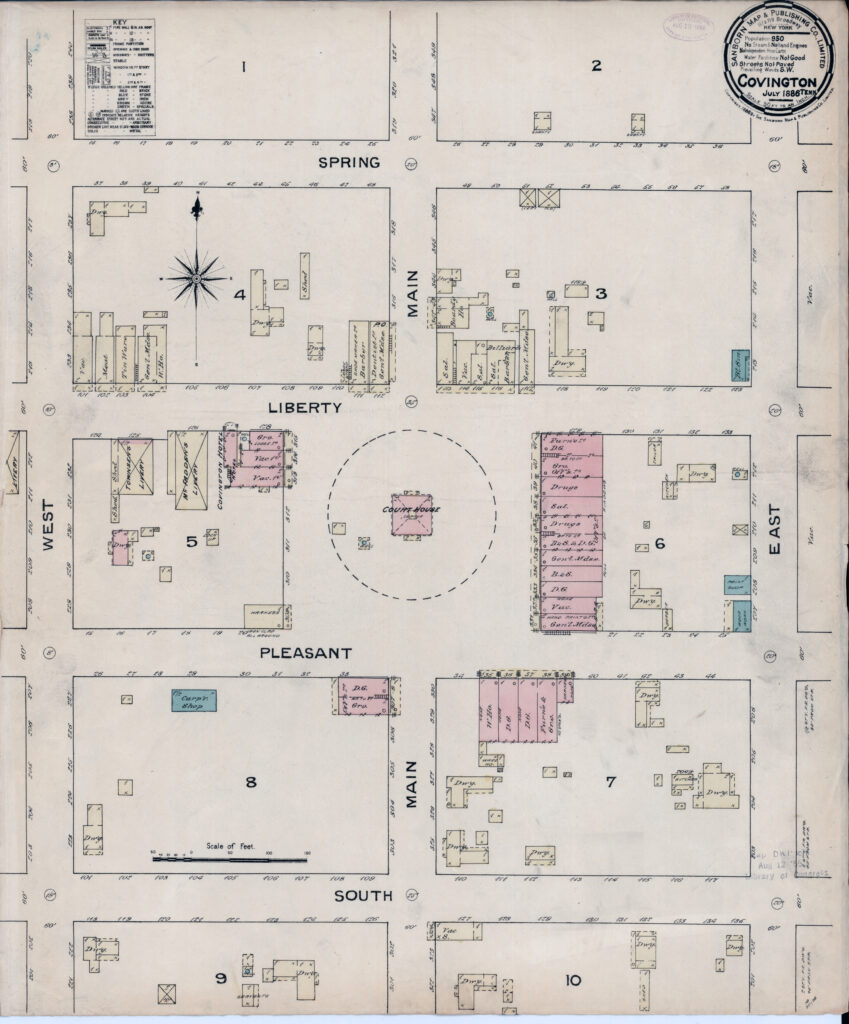This newspaper article from page 4 of the Friday, Dec. 11, 1885, issue of the Memphis Daily Appeal is a first-hand account of a visitor to Covington and a correspondent of the Memphis Daily Appeal. The article text has been reprinted as it was originally written. The photos have been added and were not printed with original article.
COVINGTON, TENN.
One of the Most Thriving and Promising Towns on the Chesapeake and Ohio Railroad.
The Growth of its Business and its Business Men – The County Government – Old War-Horses’ Views
COVINGTON, TENN., December 10 – Wind blew keen and cold from off the hills upon which Covington is built when I left the train here this morning, but it was bright and sunshiny and barter was brisk. The side-tracks were full of cars awaiting transportation and the depot agent seemed to be more prosperous and busier than at any pace which I have stopped so far. A cotton gin was in full blast and sent out clouds of steam and smoke. A flouring mill was also in operation, and didn’t care who knew it, judging from the number of times they took occasion to blow the whistle. Covington has enjoyed a reputation in all the country around for its big spring, which has capacity sufficient to supply the town if there were works to do it with. The water is noted for its purity and its never-failing flow. In the middle of the public square stands
THE COURT-HOUSE
a large, square brick structure, the headquarters of all the officials of Tipton County. The town is a regular municipality, Mayor J. R. Shelton and a board of Alderman managing its affairs. It was first settled away back in 1820. The railroad was built to it from Memphis in 1873, and in July 1883, it was extended on to Louisville. During the time it enjoyed the distinction of being a terminal point it did an extensive business handling from 8,000 to 10,000 bales of cotton in a year. Since the completion of the road the cotton receipts have fallen off on account of competition with stations above, but it is beginning to recover from the blow which almost paralyzed it at first, and shipped this season over 5,000 bales of cotton, besides other things. Among the new industries or rather the renewed industries, is
A TANNERY.
It was established five years ago, but about a year since it was turned into a steam power concern and became a chartered company. J. B. Hills is president, William Manning, manager, and W. M. White, who attends to the interest of the APPEAL at this point, and has it liberally circulated by carrier, is secretary. It obtains its water from the big spring by means of a ram, and the water is said to be the finest for tanning purposes to be found anywhere. The leather is shipped to Boston and other Eastern cities and commands a higher price than from any other Southern point. The tannery consists of a good two-story building, a barkhouse and engine house and has thirty vats.
There are about fifteen stores in Covington, the leading firms being Boyd, Exum & Wimbish, W. G. Paynes, Payne & Hill, Crofford & Clark, and Smith, Hamilton & Co.
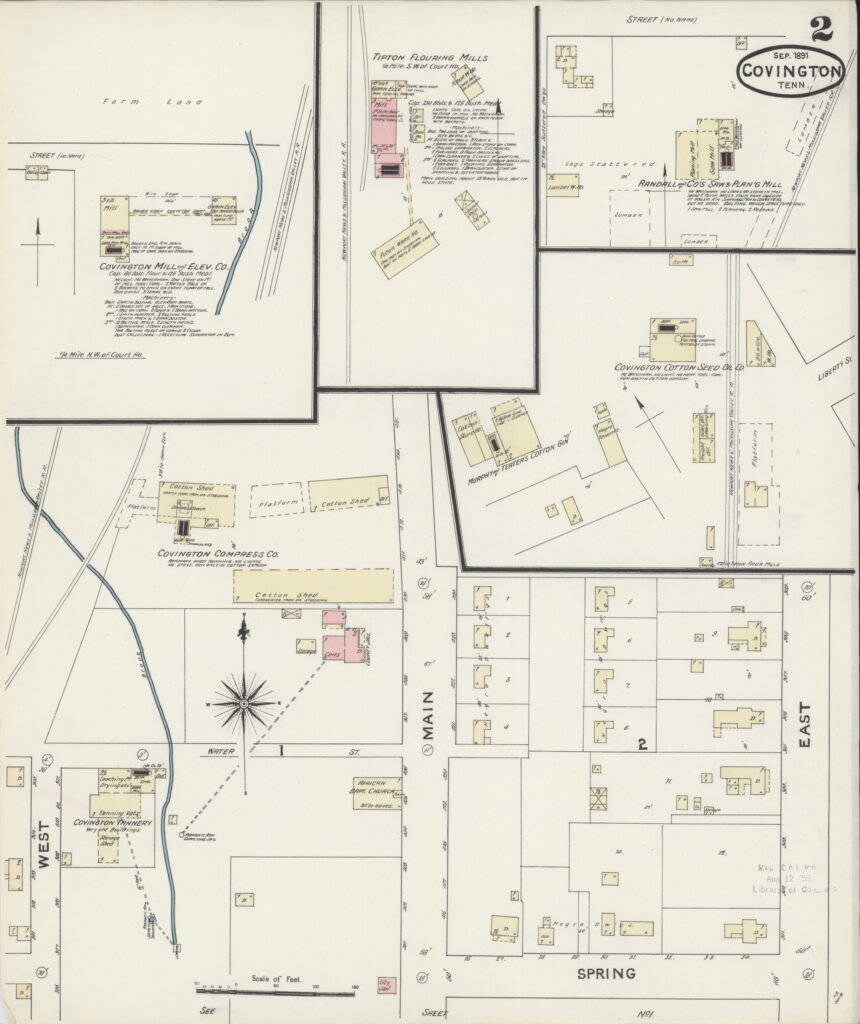
BOYD, EXUM & WIMBISH
is a comparatively new firm but has already built up a splendid business of which any of the older houses might be proud. The house was established about 10 months they go and occupies a very desirable location near the depot on the main thoroughfare. The members of the firm are all live, active men, and give their personal attention to the business. They carry a stock of merchandise of all kinds and do a general supply business. The firm also owns a handsome brick livery stable, situated directly across the street from their store. They keep a fine line of horses and mules for sale or hire and can furnish a rig as stylish as any city man would desire.
W. G. PAYNE,
who has a store on the square, is one of the most successful men of the place. He has no partner in his business, but recently took one, without requiring a cash deposit. He did require that the name of his new partner should be changed to his, however, and though he has company at home now, “& Co.” does not appear on his sign. The cards of announcement after the contract simply read “Mr. and Mrs. Paine at Home.” Mr. Payne has lived here seventeen years and knows every lady in the county. He closed out his business here at one time, but returned in 1877, and the trade which has since poured in upon him proves the wisdom of his step. He is a lively bidder for cotton, and does a big trade in meat, flower, dry goods, and general supplies.
PAYNE & HILL
are the leading druggists of the place and have a very handsome store. They have been doing business here since 1877 and kept right along with the times. Buying judiciously, they are enabled to sell close, and to manage so, as to keep a varied and good stock on hand all the time. Their trade is increasing every year, and they are not likely to let it retrograde any, judging from the preparations they’re making for a handsome display of Christmas articles. A long counter is loaded with toilet articles of every description, perfumery, and good things from Santa Claus’s [sic] pack and a thousand little nothings to please the artistic eye. The firm also deals in paints, oils, and glass, and has an arrangement with dealers by which they can supply their customers at short notice in any desired quality at low rates. Prescriptions are filled by a competent chemist and everything that pertains to the drug trade is kept on hand.
CROFFORD & CLARK
are among the heaviest dealers in cotton in Covington. They occupy a handsome double store. That on the corner is filled to the brim with dry goods, boots, and shoes, attractively displayed, and the next Is well stocked with provisions in the greatest abundance. The firm is one of the few which does in almost exclusively cash business, making quick sales at a small margin. It is now fourteen years old and growing every year.
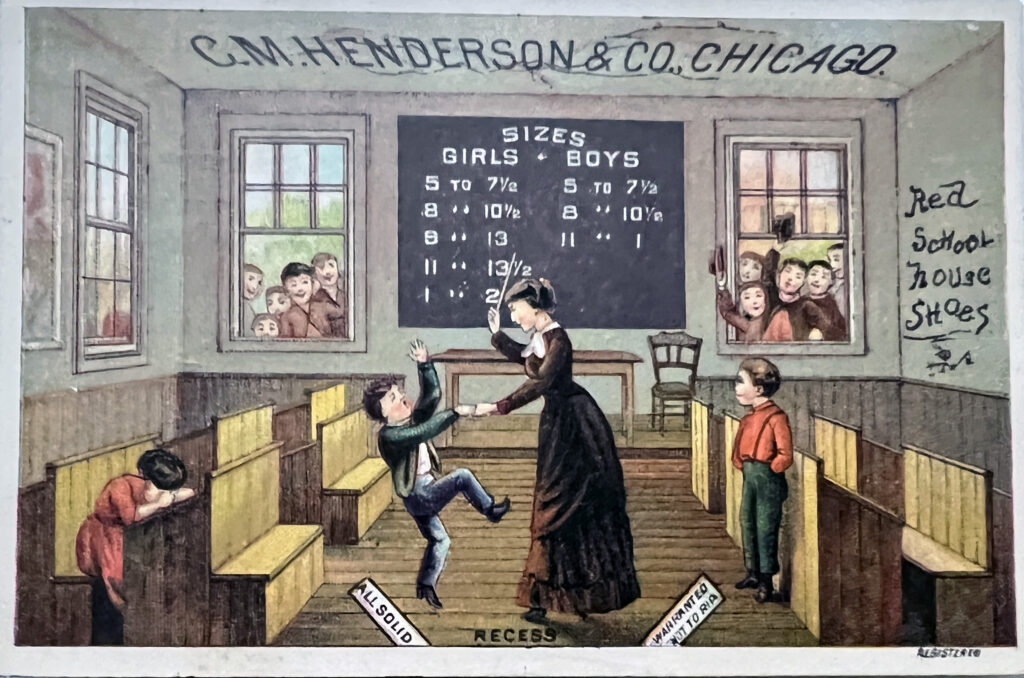
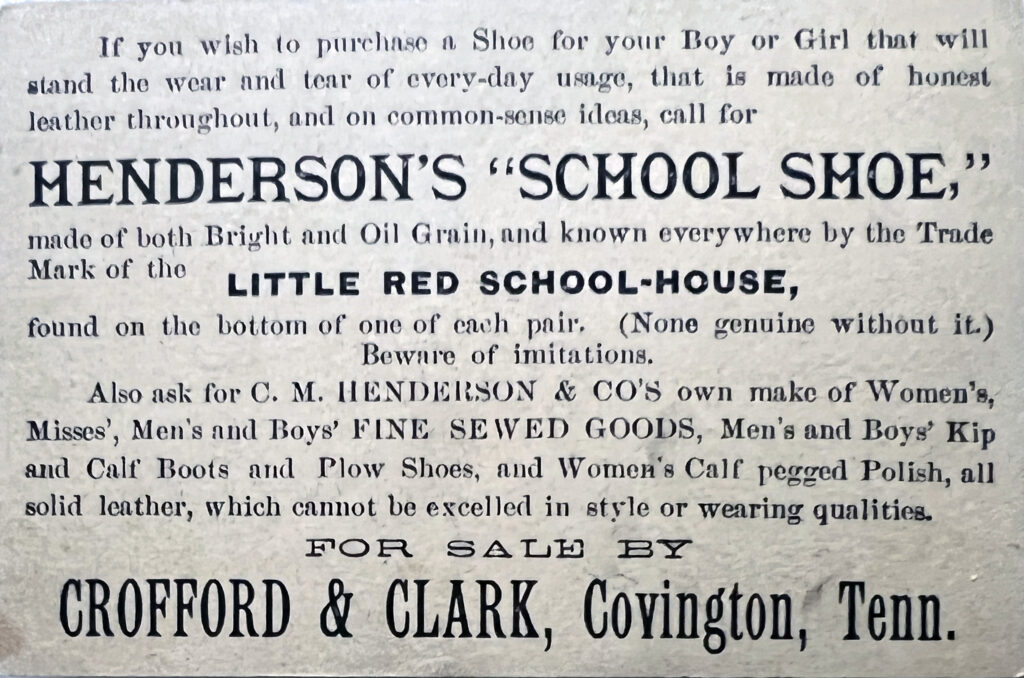
SMITH, HAMILTON & CO.
are making preparations to move into their new quarters. They are now putting the finishing touches to a commodious and well built two-story double storehouse, which they expect to move into in a very short time. Their businesses will be at once enlarged to consist the new house, and they will be prepared to do an extensive supply trade dealing in cotton, poultry, eggs, butter and general produce.
Half an hour was pleasantly spent in the office of Doctor J. M. Millen, who has an elegant suite of rooms on the north side of the square. He has a splendid assortment of all the tools required in the office of a city dentist and knows what to do with them all. He is a comparatively young man, but is ambitious, applies himself closely to business, and has made himself a big reputation in the county.
THE “WEEKLY RECORD.”
Covington has a live weekly paper in the Tipton Record, which was established in 1867 by Col. Wm. Sanford and Col. Morrison Munford, who is now the editor and proprietor of the Kansas City Times. It has been running continuously ever since and has bought out or frozen out a number of competitors. It is now conducted by Messrs. Townes Boyd and Manlius Hall, who are doing in excellent business, and who enjoy a wide popularity personally or through the influence of their paper.
No hotel has been put up since the old place was burned two years ago, those passing through here stopping with Mrs. Mathis, who is one of Arthur’s martyrs. She was postmistress here for many years.
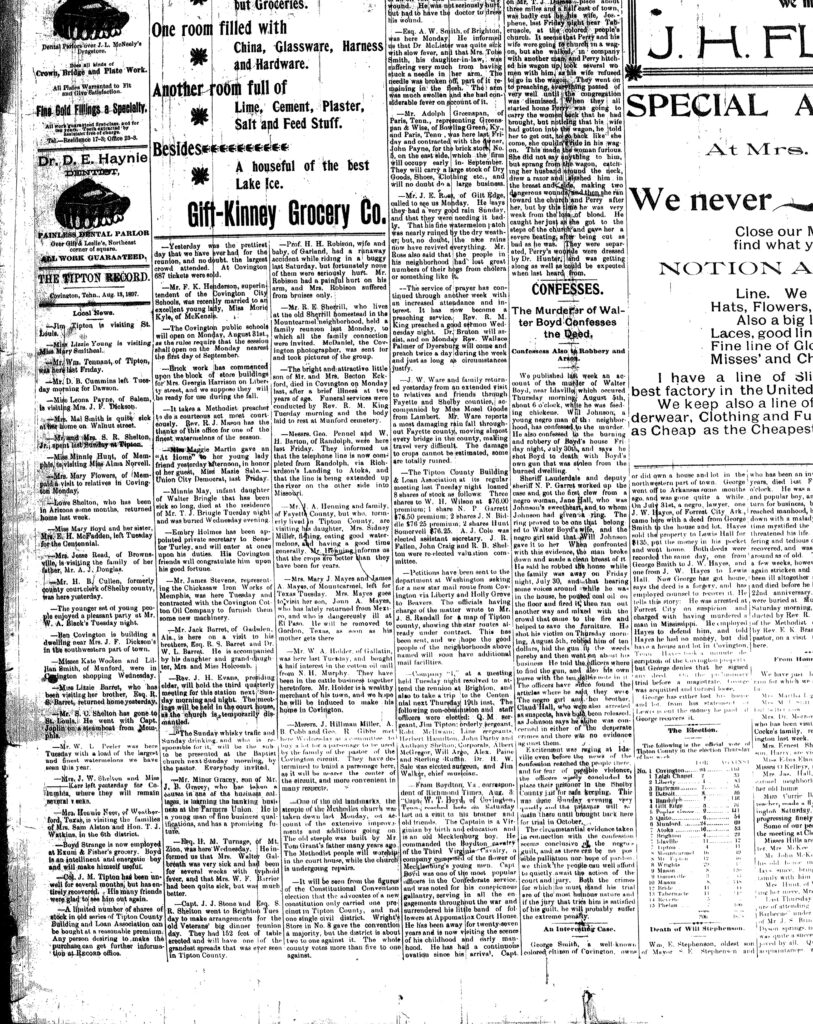
SOME CHANGES NEEDED.
A while ago I spoke of the courthouse as the home of the county officials, but in my rounds about the town I picked up a few facts which led me believe that there should be, if not be a change. It appears that the county is out some few dollars. In fact, it ought to have about $25,000 in the treasury that isn’t there. The trustee, it seems, has not been required to make regular settlements by the chairman of the county court, as the law provides he shall make, and somehow or other, nobody seems to know how, the people have chiseled. When the matter was first brought up in the County Court there was a regular howl and very nearly a fight. Several adjourned sessions of the October term were held, and they were red-hot ones, too. Finally, a committee was appointed, and they reported that the trustee ought to be made to account for about $25,000. He made a report giving himself credit for a long list of taxes which he had not collected, but even after that was deducted about
$10,000 REMAINED UNACCOUNTED
for. The thing has been running for years and years, and settlements had not been insisted upon by the chairman, who has also held his office for years and years. Finally, the trustee gave a mortgage on all his real estate, accumulated since he has been in office to secure notes for $8,000, each payable every six months. And, in spite of this mortgage fact, nobody seems to know whether he is held to blame for money he ought to have collected or for money he collected and failed to turn over. It will be news to the people of Shelby County that an official him must himself pay taxes which he has simply failed to collect. This is the odd part of it. Still, they may still they say he is the most popular man in the county and will be re-elected. He straddled the fence during the war, and somehow has held the darky vote. The white majority is so small that it takes but a little added to the negro vote to elect. And then there are
NO POLITICS
in county affairs here, every man running for himself, which will make it a still easier matter for him to get in. And this Tipton county “Squire Bleckley,” who has been running things… is a good hearted … greatest… something genial soul, whose …seems to have been a failure to do his duty. The fact that his name is Smith reminds me that Shelby County has a chairman by the same name. I am also reminded there is to be an election in January in Memphis, and that our “Squire” Smith is pulling the wires hard to get back again at the head of the court of the powerful county of Shelby. In talking about some of the similarities between Shelby and Tipton County Court affairs to-day with some of the leading citizens of Covington, I found that they took the liveliest interest in what I had to say. I account for it from the fact that this was for forty-five years the home of Justice
D.C. SLAUGHTER,
who will be the next chairman of Shelby County if the quarterly court knows itself. He was elected magistrate before he was twenty-one years of age, though that fact was not generally known. He was frequently asked why he didn’t qualify, but smiled and said nothing for six months, when he obtained his majority and was sworn end. In 1860, he was elected sheriff, and in 1862 was re-elected to that office. Two years after, though not a candidate, he was elected a third time, under a proclamation of Andy Johnson while he was military Governor but declined to serve. When Brownlow re-organized the State courts Mr. Slaughter was asked to serve, but again declined because he did not care to fill a people office unless he was chosen by the voice of the people – a patriotic resolve. In fact, the people of Tipton never stopped to ask whether Mr. Slaughter was a
DEMOCRAT OR REPUBLICAN.
In 1866, when their first regular election was held by the people, he was re-elected sheriff, and on that day Brownlow’s appointee was killed by a Mr. Lauderdale. Mr. Slaughter, who was in another part of the county at the time, was summoned by the chancellor two days afterward, who demanded that he should give his bond that very day though the law allowed him thirty days to do it in. He executed one of the best bonds ever given in Tipton county in less than twenty minutes, and took charge of his office. In 1868, Mr. slaughter was re-elected, and in 1869 while sheriff, the people, never tired of doing him honor, insisted that he should become the candidate for Senator from Tipton, Lauderdale Haywood, and Madison counties. He declined, but was so strongly urged to do so that he had last consented, and in the convention which met at Brownsville in June 1869, he was
SUPPORTED BY SUCH MEN
as Peyton J. Smith, a prominent lawyer of Covington; C. R. Simonton, for several terms a member of Congress; Capt. Holmes Cummins, several times a legislator and now one of the most successful railroad lawyers of Tennessee; Judge Steel of Tipton, now a leading lawyer at Ripley; Hardin J. Turner, then attorney-general of Lauderdale county; Thomas J. Freeman of the Supreme Court; Judge Livingston, at present Chancellor at Brownsville, and Ben Lee, Attorney-General of the State of Tennessee. Mr. Slaughter’s competitor was the Hon. Milton Brown, ex-member of Congress. The battle was fought from sun up until sun down, when Mr. Slaughter was at last victorious. In the canvass he defeated his competitor by 5,000 votes. Of the gentleman who related
THIS LITTLE HISTORY
to me I inquired how it was that Mr. Slaughter was so successful. “My dear friend,” he warmly replied, “the mere mention of Dave Slaughter’s name in Tipton county for any office meant the uniting of men of all parties in his support. This is the kind of man who offers as a candidate for chairman of your court, and the magistrates will do the best thing they ever did for Shelby County if they elect him. He is a rattler and will make a chairman not only in name but in fact. If the people of Shelby County knew him like we do up here, he would have anything he wanted.” ‘Don’t worry he will get it,” murmured a voice over my shoulder, and looking around, to my astonishment I hailed the grizzled visage of the
OLD WAR HORSE
“Surprised to see me, eh?” he said. “Well, I just ran down here on the train a few minutes ago to get out of the confounded city for a while. It makes me nervous to be around a lot of people who don’t know when they are well off. You see, they get to talking about Jake Galloway as the candidate with which they are going to beat Dave Hadden. Now, I don’t believe Jake wants it. You see, he is dead opposed to a taxing district form of government and don’t care who knows it. Now, of course, with that belief, he can’t consistently ask anybody to vote for him for its President, and, if he did, no one who wanted to keep the present government intact would support him. You can’t count the men who are opposed to it on your fingers.
JAKE’S CANDIDACY
would not only mean anti-Hadden, but anti-Taxing District. He hasn’t been making any secret of it in his sentiments and of course everybody knows all about it. But that doesn’t keep him from being invaluable to the County Court. He is one of the liveliest and most level headed men in that body, and we would have to vote against him to keep him there, if for nothing else. You know Jake – talks about the “Aggregate of populations” and all those things – broad minded fellow in fact. But he carries it a little too far when it comes to opposing “the best government the world ever saw.” Then about the other Dave, not Hadden, but Slaughter. The County Court, take it as a body, wants to do what is right, and they realize they ought, in justice to themselves, make a change.
THE TWO DAVES
will get there. But look here, now. I’m out of politics, young man, and if I stop here to talk to you, people will be suspecting who the Old War Horse is. Gimme a chew of your fine-cut.”
Taking about half a new package into his capacious jaw, the Old War Horse loped off to get his tea and fodder.
I had no idea that the Old War Horse had more than a local reputation until I came out of this trip, but his health has been inquired after by every third man I have met. Everybody who reads at all out here gets the APPEAL, and they are all for the two Daves. – A.H.P.


